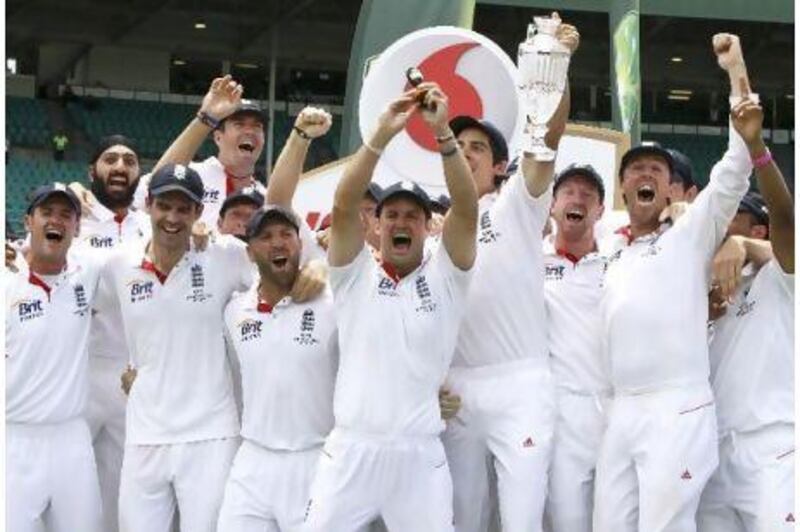Kevin Pietersen's loose lips do not always adequately capture the prevailing mood of his team.
He famously sunk a whole leadership regime, including his own position as captain, two years ago, when he misjudged the feeling of his dressing room and concluded that he was fireproof. English cricket's Icarus was anything but.
Yet when one of Channel Nine's commentary team caught him for a flash interview on the outfield of the Sydney Cricket Ground after England sealed their Ashes win on Friday, he nailed it as sweetly as his trademark flamingo shot.
"It just feels quite unreal," he said, humbly, when asked to describe how it felt to thrash an ailing Australia so comprehensively.
There was no hint of triumphalism, which he might have been forgiven for expounding given the grief he is subjected to as the Australian media's pantomime villain.
By "unreal" he meant peculiar and intangible, rather than superlative. He was spot on. It feels weird.
Englishmen of a certain age have never known dominance over their Ashes rivals. It was only recently they even tasted victory in the bilateral series, let alone the type of hegemony that earned them three victories by an innings on foreign soil this winter.
Seemingly forever, England have been in awe of Australia. Whenever they have had to play for the urn, their players have looked like pygmies throwing pebbles at giants. Now they are the ones doing the bullying. And it feels strange.
What is Nasser Hussain, the former England captain turned Sky Sports commentator, going to do with his life now?
He must be feeling an acute sense of existential despair. Everything he has ever believed in is apparently bunk.
His obsession with all things Australian has been every bit as compulsive as Jonathan Trott's need to gouge his guard at the batting crease three times before every ball.
No doubt he was delighted when his son, Joel, was born in Perth, ahead of the 2002 Ashes series. That could always come in handy if he ever wants to play for the world's best cricketing nation.
Nearly every sentence Hussain has uttered for the past 15 years has contained somewhere within it: "You don't see the Australians doing it like that..."
He has waxed ad nauseum about the merits of "the Australian system", the strength of the state game, and the eminence of its national academy. It had to be the blueprint England needed to follow if they were ever going to redress the balance.
Of course, Australia's system was once fertile.
Back in 1994, Australian cricket was so far ahead of the field that their national team ended up playing their second string in the final of a four-team international tournament also involving England and Zimbabwe.
Future greats like Ricky Ponting, Matthew Hayden, Damien Martyn and Justin Langer were only deemed good enough to play for the dirt-trackers back then.
Now the well has run dry. The same system has left them relying on the modest talents of Steve Smith and Michael Beer to carry them into the future. You can see why Australians regard the outlook for the coming years as bleak.
Perhaps Australia's greatness was never really founded on a system, anyway.
Perhaps it only came about when a perfect storm threw together two players who reinvented the way the game was played - Shane Warne and Adam Gilchrist - and a host of other greats besides.
Similarly, accepted wisdom always held that English cricket has been failed by the county system. Now they have won their most valued prize so convincingly, is all suddenly well and good within the domestic game?
Some might argue this successful England side imported ready-made figures of influence, who have by-passed the system.
The South African-born Pietersen might not have been quite at his very best in Australia, yet he still averaged 60 in the Ashes series, and his double century in Adelaide set up England's opening win.
He may still be regarded as "Schminglish" by some. But Pietersen was held back by the South African first-class game, and only found the platform to flourish when Nottinghamshire took a chance on him in the county sphere.
Trott, who was the pillar of England's batting in Australia, along with Alastair Cook, played for South Africa's Under 19 side. But he, too, served a lengthy apprenticeship in the county game, as it took him seven years to get from Warwickshire's second XI to international cricket.
The rest of the England side, led by the influential figures of Andrew Strauss, Graeme Swann and Jimmy Anderson, were all weaned in county cricket.
Should that be an endorsement of the system?
If England lose out to either Sri Lanka or India this coming summer, you can almost guarantee the shambolic/weak/Twenty20-heavy domestic game will be held up for blame.
Most likely, the tilting of the Anglo-Australian balance is just due to the natural cycle of sport. No team ever stays on top forever.
History suggests England's players should make the most of their moment in the sun while it lasts. Or else they might find themselves back in that insufferable county game.






